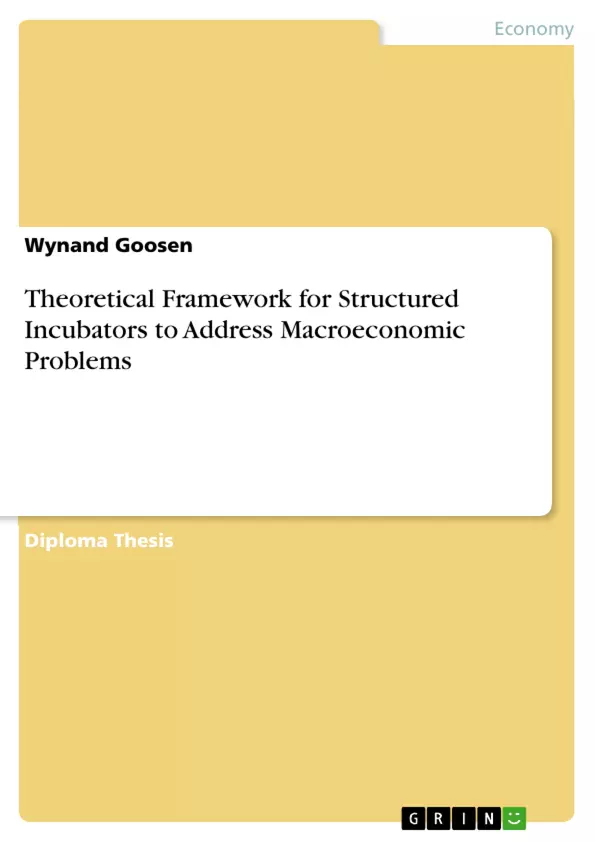This study aims to investigate the possibility of creating structured, entrepreneurial incubators to address macroeconomic problems. Various countries face Macro Economic problems such as energy, pollution, water shortage, and unemployment. Formal SMEs contribute up to 40% of GDP in emerging markets and provide 70% of employment. The possibility of incubating SMEs to address Macro Economic Problems should be investigated to stimulate the Economic Emancipation of the youth.
The principle of a "structured incubator" is born from the problem that the formal economy can no longer supply the required growth in "jobs" that our society needs. Instead, economies must create "marginal" capacity and new industries to facilitate the "economic emancipation" of its people. Business incubation is one of the most viable tools for increasing the number of small businesses. South Africa needs a new framework to develop the structured incubators' role in creating small businesses. Such structured incubators would need to capacitate themselves to take entrepreneurship to scale. New SMEs can be developed in construction, catering, water saving, e-waste, hairdressing, plastic recycling, retail, trade, solar, and many other industries if individuals can be capacitated in cohorts to become SMEs.
The need for structured incubators is supported by a literature review, a survey of youth needing economic emancipation, an industry analysis and the researcher's experience in training young entrepreneurs. The grounded theory approach is used to identify concepts and categories that inform the themes in support of structured incubators.
Given the above, we must equip people with skills to become less dependent on the state. Macroeconomic problems should be viewed as the source from where SME opportunities emerge. A framework for capacitating structured incubators that can develop large numbers of young people in cohorts must be developed. Such incubators must be capacitated, as current incubators are not developing entrepreneurs at scale. Individuals in need of economic emancipation could be trained to operate as SMEs and provide more employment.
The study suggests that structured incubators could solve macroeconomic problems, like poverty, unemployment, and the need for economic growth. A new structured incubator framework should aim to identify and develop young people into successful small enterprises.
Inhaltsverzeichnis (Table of Contents)
- Chapter One: Introduction
- 1.1 Introduction
- 1.2 Problem Statement
- 1.3 Research Objectives
- 1.4 Research Questions
- 1.5 Significance of the Research
- 1.5.1 Significance to Academic Community
- 1.5.2 Significance to Industry
- 1.5.3 Significance to Others
- 1.6 Scope of the Research
- 1.7 Operational Definitions
- 1.8 Organization of Chapters
- Chapter 2. Literature Review
- 2.1 Overview
- 2.2 The Broader Concepts
- 2.3 Specific Concepts
- 2.4 Industry Analysis
- 2.5 Gaps in the Literature
- Chapter 3. Methodology
- 3.1 Overview
- 3.2 Research Design Phases
- 3.3 Unit of Analysis
- 3.4 Sampling Design
- 3.5 Data Collection Methodology
- 3.6 Analysis Methodology
- 3.7 Conclusion
- Chapter Four: Research Results
- 4.1 Introduction
- 4.2 Concepts Identified from the Literature Review
- 4.3 Concepts Identified from the Industry Analysis
- 4.4 Concepts Identified from the Research Questionnaire to potential incubates.
- 4.5 Concepts identified from the researcher's personal experience
- 4.6 Themes
Zielsetzung und Themenschwerpunkte (Objectives and Key Themes)
This study aims to investigate the possibility of creating structured incubators to address macroeconomic problems, focusing on the potential for Small and Medium Enterprises (SMEs) to provide solutions. The research explores the concept of a "structured incubator," a framework designed to identify, capacitate, and support large numbers of SMEs to address specific macroeconomic challenges.- Identifying and analyzing macroeconomic problems
- The potential of SMEs to solve macroeconomic problems
- The development of a framework for structured incubators
- The need for support for structured incubators
- The impact of structured incubators on economic development and job creation
Zusammenfassung der Kapitel (Chapter Summaries)
- Chapter One: Introduction provides an overview of the research problem, stating that macroeconomic challenges like energy shortages and unemployment can be addressed through entrepreneurial development. The chapter outlines the research objectives, questions, significance, scope, and organization of the study.
- Chapter Two: Literature Review examines existing research and industry analysis related to the topic of structured incubators. It explores broader concepts like entrepreneurial development and specific concepts relevant to the creation and operation of incubators.
- Chapter Three: Methodology outlines the research design, data collection, and analysis methods used in the study. It describes the research design phases, unit of analysis, sampling design, data collection methodology, analysis methodology, and provides a brief conclusion.
- Chapter Four: Research Results presents the findings of the research, including concepts identified from the literature review, industry analysis, research questionnaires, and the researcher's personal experience.
Schlüsselwörter (Keywords)
The study focuses on the creation of structured incubators to address macroeconomic problems, highlighting the potential of SMEs to solve such challenges. The key terms include: structured incubators, SMEs, macroeconomic problems, entrepreneurial development, economic development, job creation, and industry support.- Citar trabajo
- Wynand Goosen (Autor), 2023, Theoretical Framework for Structured Incubators to Address Macroeconomic Problems, Múnich, GRIN Verlag, https://www.grin.com/document/1430265



